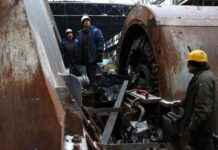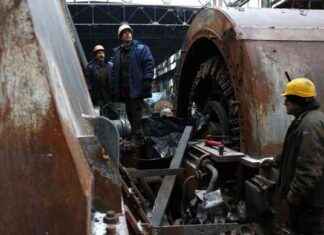On the 200th day of the war in Ukraine, the Zaporizhia nuclear power plant continues to be talked about. Ukraine announced, this Sunday, September 11, the shutdown of the sixth and last reactor in operation of the largest power plant in Europe, occupied by Russian forces since the beginning of March. “Today, September 11, 2022, during the night at 03:41 a.m., unit number 6 of the (power plant) was disconnected from the electricity grid,” said Ukrainian operator Energoatom in a press release. “Preparations are underway for its cooling,” adds the operator.
The sixth reactor had been operating in “island mode” for three days, feeding only its own needs after power lines were cut by Russian bombing. The restoration of one of these lines on Saturday enabled the operator to take the decision to place the site in “the safest state – cold stop”. If the lines continue to be damaged, the plant will rely on emergency diesel generators, “the duration of which is limited by the technological resource and the amount of diesel fuel available”, informed Energoatom. The objective: to maintain the cooling of the reactors and avoid a nuclear accident.
For weeks, confusion has reigned around the Zaporizhia complex, which has been targeted by multiple strikes of which kyiv and Moscow accuse each other. The plant has six nuclear reactors with a capacity of 1,000 megawatts each and which produced 20% of Ukrainian electricity before the Russian invasion.
On Friday, the International Atomic Energy Agency (IAEA), which was able to visit its site on Thursday, September 1, reported a “total power outage” in the Ukrainian town of Energodar, where the nuclear power plant a situation which compromised “the safety of operations”.
“This is totally unacceptable. This cannot continue,” IAEA Director General Rafael Grossi said in a statement on Friday, calling for “an immediate cessation of bombardment in the area”. The electrical infrastructure supplying the city had been destroyed by strikes at the thermal power station, causing a total cut in water and electricity,” he said. “Given the intensification of the bombardments which are incessant, it is unlikely that it will be possible to restore reliable off-site power to the plant,” added the IAEA chief.
In a report published on Tuesday, September 6, the UN nuclear policeman called for the establishment of a “safety zone” to prevent a nuclear accident at the Ukrainian power plant in Zaporijia, occupied by the Russians. “The current situation is untenable,” wrote the body in this 52-page text. “It is urgent to take provisional measures”, she continues, advocating “the immediate establishment of a nuclear security and protection zone”.
Among the points of concern, the plant is also understaffed. The fire teams are operating with 80 people instead of 150. “This is clearly a breach of security, and a challenge to the IAEA’s third rule on the operation of teams, which in my opinion is the more important”, reacted in L’Express, Ludovic Dupin, director of information for the French Society of Nuclear Energy (SFEN), on September 6. The Agency also noted “the extremely stressful conditions” in which Ukrainian personnel work, under the control of Russian troops. Some staff members are even victims of Russian abuse, according to site managers.
Thus, the hypothesis of an accident cannot be ruled out on this gigantic complex. The worst-case scenario: the risk of a sufficiently long and significant power outage that would prevent the cooling of a reactor core. What would result would be a significant release of radioactivity. “In this context, we could have a chain of events close to that of Fukushima, estimated at L’Express David Boilley (President of the Association for the control of radioactivity in the West (ACRO), on 12 august.
On the diplomatic level, the international community continues to follow with concern the saga around the Zaporijia power plant. President Emmanuel Macron spoke again by telephone on Saturday with his Ukrainian counterpart Volodymyr Zelensky about the situation still “very worrying” around the site, said the Elysée. Regarding the Zaporijia power plant, Emmanuel Macron and Volodymyr Zelensky “share the same demand for the withdrawal of Russian forces from the area to guarantee the safety and security of nuclear installations”, indicates the Elysée. Emmanuel Macron and Volodymyr Zelensky had already spoken on this subject on Monday.








